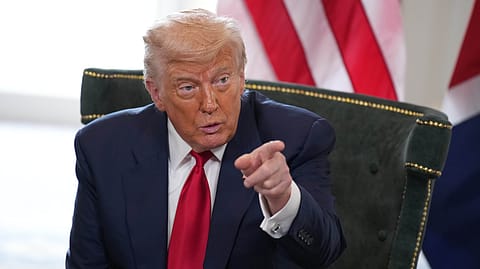Trade policy uncertainty is major source of global instability: UNCTAD
The UNCTAD report highlights that policy changes in major economies, such as the U.S., can disrupt global supply chains. To counteract this, the report suggests diversification and trade agreements, along with international coordination, to enhance economic resilience and stability.

Trade policy uncertainty has become a major source of global economic instability in 2025, the latest Global Trade Update published by the United Nations Trade and Development (UNCTAD) notes. Diversification of export markets and participation in trade agreements (both being tried out by India now) can help reduce this uncertainty, it states.
UNCTAD’s Trade Update, published in September, says policy changes in one country can send shockwaves across the globe, disrupting suppliers, manufacturers and markets. Stating that the recent policy shifts of the U.S. illustrate this, the report points out that as the world’s largest importer, even modest changes in the U.S. policies reshape supply chains and alter global trade flows.
“Policy uncertainty is rarely accidental. Governments recalibrate trade rules in response to domestic pressures and sometimes use ambiguity to gain leverage in negotiations,” the report states and adds: For decades, multilateral and regional agreements discouraged abrupt shifts and stabilized flows, with uncertainty mostly limited to episodes like Brexit, COVID-19 or US–China trade tensions. But in 2025, with weakened rules and fierce competition for critical raw materials, uncertainty has soared to record levels.
The trade policy uncertainty weighs on the global economy in three keyways, the report says. The first, higher costs, slower growth means companies must carry excess inventory, hedge against losses, and reconfigure supply chains, raising costs and discouraging investment. The second issue is risks to financial stability as sudden shifts unsettle exchange rates and weaken investor confidence, capital flows, and credit conditions. The third effect, according to UNCTAD, is erosion of trust as weaker rules and unilateral actions fuel retaliation, making global cooperation harder.
The report further says that firms with multiple markets can redirect shipments when one closes, cushioning losses while countries with broader export bases offset downturns in one region with gains elsewhere. Similarly, trade agreements provide rules and dispute settlement mechanisms, which reduce shocks and encourage long-term investment, it observes.
The practical steps recommended in the report to restore stability and strengthen resilience include advance notice of policy changes so firms and partners can adapt in time, clear, data-driven trade measures to give investors and businesses confidence international coordination through UNCTAD, the World Trade Organization and others to avoid retaliatory cycles, in addition to trade agreements and diversified export markets.